GLOCAL TOURISM CZAR
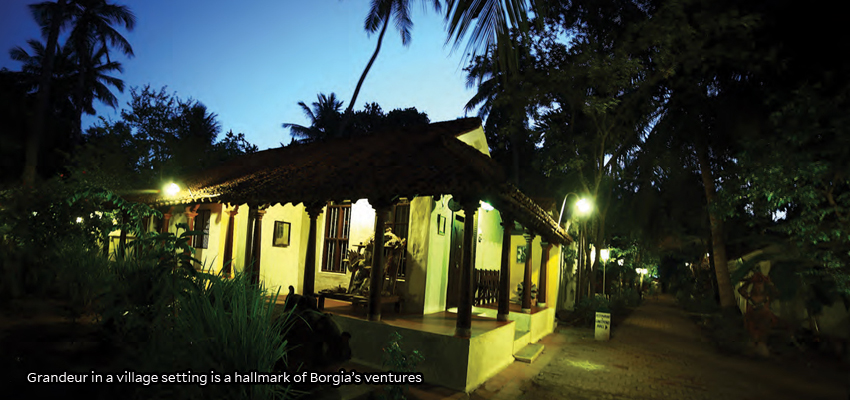
Steve Borgia is the Founder-Chairman and Managing Director of INDeco Group of Hotels, the only Indian hotel group to win the distinguished Global Eco Tourism Award. His pioneering rural tourism in India has been one of his most significant contributions to hospitality tourism and development. Be at the UN, Government of India, Press, Art, Films, Hotels or the Corporate, Tourism, or as Destination Developer, he moves beyond the competition, finding a unique position. His companies and concepts are local people centric.
Steve Borgia’s Indian Heritage Museum is another great idea born out of his business acumen and concern for Indian heritage. He is presently the Vice President of the Indian Heritage Hotels Association. He is also founder-member of the Responsible Tourism Society of India and served as a member of the advisory committee on world heritage matters. He has authored several books and established museums. Interestingly, the concept of INDeco Hotels has been acknowledged by Fortune magazine as the sixth-best idea to save planet earth. He speaks eloquently with Corporate Citizen on the earth-friendly journey of his hospitality venture
"Despite the fact that 70% of people in India are from rural areas, none of our planning or policy or development considered them. That affected me a lot. I wondered what I could do to help them revive. I decided not to set up shop in the urban pockets, but invest in rural areas instead"
Corporate Citizen: Your passion for rural tourism is so admirable. How did you develop an interest in it?
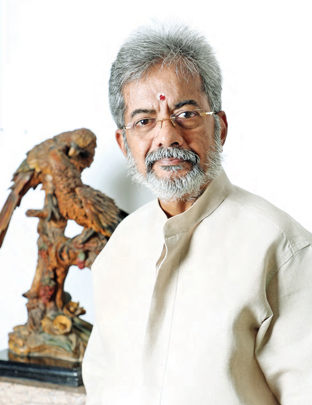 Steve Borgia: Down-to-earth hospitality
Steve Borgia: Down-to-earth hospitalitySteve Borgia: The vast rural-urban divide that I witnessed when I returned to India disturbed me a lot. I found people being exploited by urban policies, and despite the fact that 70% of people in India are from rural areas, none of our planning or policy or development considered them. That affected me a lot. I wondered what I could do to help them revive. I decided not to set up shop in the urban pockets, but invest in rural areas instead.
I bought a large urban-based company, made some money from it and desired to do something where I could involve local people. This was not going to be social work but an accountable business. I felt that if I opted for tourism entrepreneurship in the local areas, I needed to give back something to the local community. I knew I could not change this country but I could make a difference in a small area. So, I chose Kumbakonam in Tamil Nadu where we have heritage hotel properties, and today after 30 years, we have shown how tourism can transform a rural pocket. The per capita income of the locals, which was meagre earlier, has substancially climbed through multiple sources of revenue. We have made the town a sterling example of good governance. Kumbakonam now is one of the cleanest towns in India, and our railway station is also the cleanest railway station in India. All the girls’ schools here have toilets. We have over 57 air-conditioned bus stops with ATMs attached, which do not exist even in big cities like New Delhi and Chennai. We converted all the beggars into sweepers, and that is how the town is so clean. They collect the garbage and dump it in a place where 100% of the solid waste is treated-that subsidises the cost of electricity. So, electricity in Kumbakonam costs 13% less than the rest of the country.
CC: You’re not just an entrepreneur then-you have steered a social revolution. Where were you earlier in India and when did you come back?
Like any other young man in India, my family put pressure on me to do my IAS because my grandfather wanted to see me as a Collector. Right from my childhood, I always wanted to be a Maharaja, not in terms of personal wealth, but a Maharaja where the world around me could be made beautiful. When people laughed at my desire to become a Maharaja, I explained that I wanted to build beautiful buildings, I wanted people to be fed, I wanted to create a beautiful atmosphere, I wanted to make sure everyone was happy around me. And somewhere down the line, I managed to convert that dream into a desire and I fulfilled it. Today, it has become my business. My business today is all about making gardens, doing agriculture, farming, building palaces and making the place beautiful. I’m very happy that I managed to carry that little boy’s dream this far.
CC: What did you do after entering IAS?
When I got through my IAS, it was a bit sticky for me. It was very claustrophobic. I quit and I went to Europe to study pedagogy. I then joined UNICEF and I was happy there. It then began disturbing me that in my own country, there is so much poverty, and what was I doing in an alien land? UNICEF has a policy of not posting you in the country you hail from. I was working more in Africa and Europe. I got back to India and decided that this was what I wanted to do, and so I moved to the rural area here. I reached here in 1986 and worked with a sick company, managed to revive it and made some money, which I then invested in the rural areas.
CC: So, you chose the hospitality industry?
I formulated the INDeco Group of Hotels, a company comprising leisure hotels. Ecology for me is to make everything as it was once upon a time. We work on a cyclic number of factors. In fact, the company was adjudged the sixth-best company for its concept to save planet Earth, by Fortune magazine. Our properties are not restricted to just providing rooms and shelter but involve a lot of emotions that affect the people around because the tourism that doesn’t offer equal benefits to the local community is not fair tourism. We understand this 100%. For instance, all our hotels are rural centric, which means 100% of the staff employed here are from within this region. The local people grow all the fruits and vegetables that we cook in our hotels. We do not buy anything from outside. The local people stitch my staff uniforms. The wood that I use is not imported wood. We spend 100% of our project and operational money in the region so that their per-capita income goes up. We not only spend our money here but we also teach the local people how to keep the money and not to export that money. If you are going to buy timber, I advise them to use coconut and palm timber and not import teakwood. If you are going to buy roofing material, buy one that is available in the village, and do not buy Mangalore tiles and lose all your money. The concept is now clear to the locals as they have realised the benefits. So, if I build a hotel in Yercaud in the hilly areas, then it will benefit the people in the mountains there. If I build it near the seaside, it will benefit the fishermen’s community. Wherever you build you should be rural-centric or people-centric and also very creative.
"Right from my childhood, I always wanted to be a Maharaja, not in terms of personal wealth, but a Maharaja where the world around me could be made beautiful"
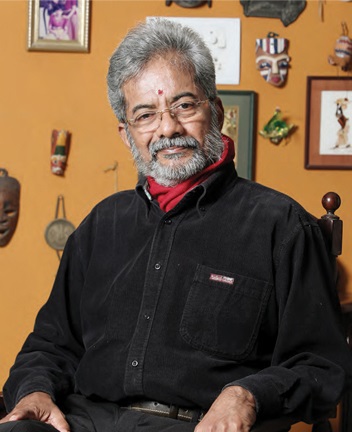
CC: How many hotel properties do you have now?
We have two hotels, which are operational now. We launched this product in 1994. The third hotel in Mahabalipuram is under renovation. We don’t just look at our hotel property as a shelter. We look at it as an experience for our guests, as an emotion, and something very innovative. Even the architects and engineers are local people. How did my grandfather build this house? He built it with the local mason. So, I build my hotel properties with the local people. We have no technocrats. Everybody emerges from the local community. However, this is not social work. This is a very competitive and authoritative business. What is brilliant about this is that there is so much give and take and learning with the local people. For instance, at a time, 30-40 architecture students are interning with us. They learn from the local people. Local people learn from them. Together we have created all these masterpieces.
CC: How did you market your unique hotel?
When I built the first hotel in the middle of nowhere in a rural region, everyone was shocked. They wondered why Mr Borgia would spend so much time and money on a hotel in a rural area, where you don’t even have electricity. But then I went to Delhi and I inspired the local travel agents, got them over and I made them understand that tourism in India is not about giving an Oberoi or a Sheraton; it is all about giving them remote experiences that no one else can give in the world. They understood that and they brought guests here, and then we just picked up. What I started as an eight-room hotel is today a 100-room hotel, and people long to be here.
CC: Tell us about your hotel to the village concept.
We brought the village into the hotel at one point in time but now we even take the guests into the villages. For instance, when guests come, they say that they want to eat a typical fish curry. We bring the family, (taking care of the sanitation and hygiene), pick up the guest, go to the market and buy fish, come home, cook the fish, and have fish curry rice. The guest has not had this experience before. Our cooks train these people not to add too much chilli. They eat the fish curry, rest in their verandah, and come back to the hotel in the evening. These are very rare experiences. Sometimes, we take them to the village river and bring them back in the evening. They go to the waterfalls and when the guests come back, you can see them emoting with the rural people they spent the day with. They are so sad to let them go. For a westerner, these are very emotive experiences. Actually, India is the only country that can sell emotions.
"You have to have dogged perseverance. I tell my staff, if you want to do something you should do it like the terrorist who is willing to kill himself for his conviction. He is one guy who will not open his eyes or set his teeth backwards"
CC: You need the courage of conviction to think and implement out-of-the-box...
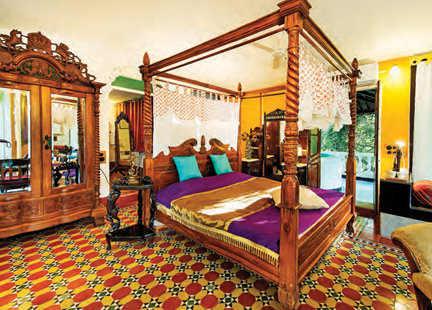 Traditional yet trendy rooms
Traditional yet trendy roomsPeople say I’m very convinced about what I am doing because I think I have learnt to work in this country. Normally, I do not tell people what I do. I do not talk about what I want to do. I just do it. Because if I tell people that I’m trying to do rural tourism, they tell me “Rural tourism is a failed product. Don’t do that. You’ll burn your fingers. You’ll suffer and go bankrupt.” Everyone will have something negative to say. People have something negative to say about things that are not even within the framework of their experience. I learnt from a great philosopher, “Don’t talk. Just do”. Therefore, I started doing things and it worked for me. And what if it fails? You start all over again. You are not a loser. It is the conviction with which you do things that matters.
You have to have dogged perseverance. I tell my staff, if you want to do something you should do it like the terrorist who is willing to kill himself for his conviction. He is one guy who will not open his eyes or set his teeth backwards. When you say go, he goes to the target. Unfortunately, if the bomb explodes, it is good for him. If it doesn’t explode, it’s good for us but that’s just his job.
CC: So, all your staff is also from the local community?
Yeah. And they speak through their smiles with the visitors. Somebody like Stephen Velásquez, Director of the Smithsonian Museum, visited us a few years back and he wrote in the feedback book “the world’s best staff ”.
CC: What else have you added to the visitor’s experience?
We introduced foot massages for guests when they come. We relive for them the era of a Zamindari house in the village. When the guest arrives, we take a cloth and wipe his/her suitcase before it goes into the room. Then we massage the guest’s feet with herbal oil because the feet are tired. Then the guest is taken to his/her room. The boys in the restaurant do not ask what they want to eat. They ask, what do you feel like eating?
"We brought the village into the hotel at one point in time but now we even take the guests into the villages. For a westerner, these are very emotive experiences. Actually, India is the only country that can sell emotions"
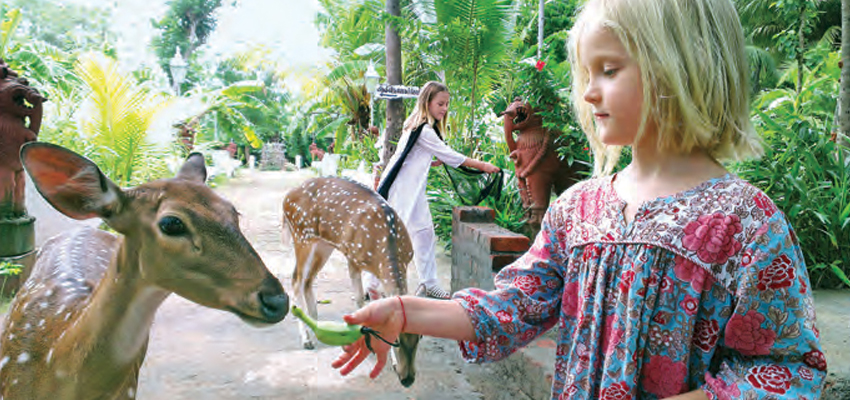 Nature at your beck and call
Nature at your beck and callCC: What was the impact of the Covid-19 pandemic on your hotels?
When Corona hit, it affected all of us. We had to shut down like everybody else but within two days of shutting down, the government said you can host weddings with maximum of 50 people. So, we converted the hotel into five-star wedding centres and did five to six weddings a week. We followed all the protocols. We converted our swimming pool into a huge fish tank, grew edible fish, and sold two tonnes of fish a month. We bought ten lorry loads of tapioca sticks, planted them all over the village, and ensured everyone had food and fish to eat. Today, we have become a big wedding destination. A couple of weddings are happening every week. We have worked so hard and been so innovative that in December of 2020, we garnered the highest revenue ever since our inception since 1995-96.
This is all possible but it has to be owner-driven. It cannot be employee-driven. It’s not as if employees cannot do it but you’ve got to take quick decisions which only an owner can take. We have been so innovative in our approach and we have shared so much with the world and today we are with the world.
CC: What did you think of the complete lockdown?
I thought that there was no need to frighten the industry so much. Everybody got scared, there was too much unwarranted information, and we were too ill-prepared. We could have been a bit more careful in handling the Covid situation. Luckily, my experience with Ebola came in handy. I was working in South Africa with the UN, I was a bit cautious, and I told people how to take precautions.
I posted a message on Facebook and sent about 10,000 mailers to young people who were working abroad, especially in the USA. I asked them if they were getting concerned about their parents in India because even I went through the same experience when I was working abroad. I told them that if they wanted to, they could send their old parents to me. I would take care of them and guarantee that they would not be affected by Covid. I would treat them and give them the best experience.
I had 72 senior citizen couples who showed interest in coming and living with me for three months. I made arrangements for their travel and visas and converted the hotel into an Ayurvedic Centre, I bought e-passes for them. I told travel agents that instead of getting passports and visas, get me e-passes. Use your taxis to drop these elderly guests at my property. At least I can give you business. So, they brought the elderly to me and I had young boys and girls from the villages who would hold their hands and take care of them, following all protocols. I took care of them for a full three months, some even for six to seven months. Their children in the US were so happy, they thought it was a big favour I had done for them. For me, it was only my occupation. INDeco Hotels, Swamimalai, is a 15-acre property, green all over. They were all enjoying the greenery without wearing a mask. This was the only community that lived without a mask. They didn’t know what a mask was. There were deer and peacocks running around too.
CC: What has changed over the years, with visitor requests and queries?
Maybe I was ahead of the time. Twenty-five years ago, people used to call us and ask “Are you centrally air-conditioned?”. “Do you have a nice cubicle building” “Is your staff well-educated?” We would say no, and that would be the end of that. But today they ask, “Are your air conditioners stand alone?”, “Are your rooms stand alone?”, “Is there a gap between one room and the other”, “Are your toilets centrally connected?” Today, people have come to appreciate these spread out cottages and the greenery which has stood to our advantage. We were ahead of our times.
CC: Tell us about your unique museum.
First, we took care of the hotel, and then we went into the village. There was so much in the village to conserve. We conserved that, and then we had to construct a museum for it. I believe conservation, preservation and promotion are a big part of tourism. Tourism is not just about shelter and food. It is also co-operation. Our museum today is said to contain one of the finest civilian collections of museum objects anywhere in India. It has the handcuffs of Subhash Chandra Bose who was brought from Kolkata to the Cellular Jail in the Andamans but because the public would not leave him, he was brought to Chennai, kept in the Madras Central Jail overnight, and then taken to the Cellular Jail. We have the handcuffs with which he came in, in our museum. We have the attire that he sported that night. He has signed on that. When the Government decided to break the Madras Central Jail because our Chief Minister was imprisoned, we bought the cell of Subhash Chandra Bose. Its main gate is in our museum. We have the first aircraft that landed in Madras Presidency. We have the entire collection that the British left behind. You will be surprised to see that the British when they lived in India, used all those things.
"I believe conservation, preservation and promotion are a big part of tourism. Tourism is not just about shelter and food. It is also co-operation. Our museum today is said to contain one of the finest civilian collections of museum objects anywhere in India"
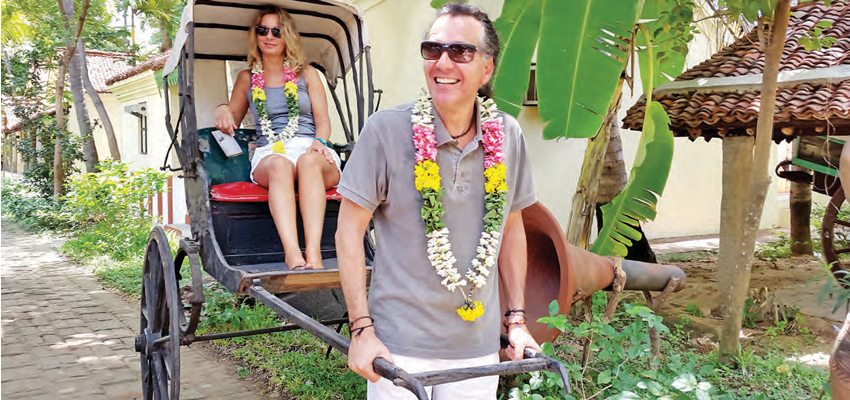 Leisure beyond air-conditioned environs
Leisure beyond air-conditioned environsCC: How long do the guests stay in your hotels?
Normally, the guests stay with us for two days, only to realise that the next time they come, they must stay for a week.
CC: Your bio-data says that you are a clairvoyant? What does that mean?
A clairvoyant is a person who is very sensitive to the earth. When he goes and keeps his hands on the earth, he can feel what is going on under it. I do not build in certain parts of my hotel because I know there is something very precious under that ground. You can feel the rivers that are flowing underneath, you can feel a whole town in ruins underneath. If you were a historian, you would feel all that. I don’t build everywhere. I build where the trees can be spaced. Where the earth is free for me to build. I will not go and put some weight over something which has beautifully existed under the ground.
Similarly, we all must adopt social sensitivity. We must have table manners and social etiquette. Now sensitivity to our own environment is essential.
CC: Tell us about your family...
My wife is a gynaecologist and works with Apollo Hospital. We have two daughters. One is married and is an archaeologist. Unfortunately, the Indian Government does not allow archaeologists to dive on Indian shores. My second daughter is an animal lover, so, she is busy taking care of wounded animals on the road, be it cats or dogs or cattle or bisons. We are a very independent-thinking family and we respect each other’s passion and freedom. We help each other to do whatever we want to do. Our hotels are pet friendly. We realise how pets are dividing the family. For instance, if you want to go on a holiday, somebody has to stay back home, but with us, you can bring your pet and we will take care of it.
CC: What is the philosophy that you live by?
I live by the philosophy that I want to be a Maharaja, which means I want to make people happy by feeding them and taking care of them. I love my country very much. I want the world to respect my country and I want my people to be the happiest because they deserve to be the happiest people on Earth.